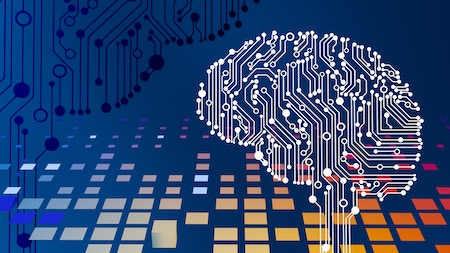By Amy Schabacker Dufrane
AI. Artificial Intelligence. Open AI. ChatGPT. Large Language Models. Machine Learning. We’ve been bombarded by these terms and the promise – and threat – of what they can or cannot do for us. Artificial intelligence isn’t new but how it is used by HR, the workforce and learning organizations has changed.
A British computer pioneer named Alan Turing is considered the father of artificial intelligence. During World War II, he is credited with identifying the concept of machine intelligence, whereby computers can learn from experience and use those principles to solve new problems. One of his earliest examples of this theory was a chess-playing computer. Fast forward to 1997 and IBM built a chess computer used to beat the then current reigning world champion. Fast forward again through the evolution of AI-powered robots, autonomous vehicles, chatbots and virtual assistants. People are equally delighted, mystified and somewhat annoyed to learn they are speaking with an AI-powered customer support machine. Business leaders worry about how AI will replace workers; workers are concerned about what AI means to their jobs.
But AI isn’t new. To different degrees, we’ve been experiencing it first-hand whenever work and the corresponding search for information are automated. What’s new is that we cannot ignore it; similar to the advent of the interfaces such as Netscape and AOL that enabled us to tap into the power of the internet, AI (and the ChatGPT interface) is critical to how business will work.
The difference between the internet and artificial intelligence is cognition, which is what makes AI so exhilarating as well as so scary. It’s a game changer for the workforce and, consequently, HR professionals. Here at HRCI, we’re very excited by how it creates value for our community:
Curriculum Guides: As organizations adopt skills-based workforce architectures, being able to select courses based on their goals or gaps speeds up time to results. Similar to five-star ratings on Amazon, other HR professionals can share what helped them to make it easier for other learners.
Course Assistants: AI can help learners better understand what they are being taught. Think about that one for a moment. Remember the math tutor that your parents hired to help you get through geometry? Similarly, but without the added cost and time constraints, learners will be able to ask AI systems to explain concepts in different ways or provide examples. While the course information is fixed, an AI course assistant gives unlimited real-time variations of the content to ensure learners can succeed.
Course Design: Based on the experiences of other learners, AI can help create new products and tailor experiences to shape course design. As demand for skills increases, AI can adjust the learning roadmap, ensuring certifications are meaningful in the context of the workplace.
In preparing this month’s article, I couldn’t help but ask ChatGPT “Why is AI important for HR?” Within seconds, it said:
“AI (Artificial Intelligence) has become increasingly important for HR (Human Resources) due to its ability to streamline and enhance various aspects of the HR processes and functions.”
And there was more – a list of what’s top of mind for most HR professionals:
“Here are some reasons why AI is important for HR:
- Efficiency and Automation
- Data-Driven Decision-Making
- Improved Recruitment and Talent Acquisition
- Enhanced Employee Experience
- Personalized Learning and Development
- Diversity and Inclusion
- Performance Management
- Predictive Analytics
- Remote Work Management
However, it’s important to note that while AI offers numerous benefits, it also comes with ethical considerations, such as data privacy, bias in algorithms, and potential job displacement. HR professionals need to strike a balance between leveraging AI’s capabilities and ensuring that human judgment and ethics guide its implementation.”
The caveats identified directly by ChatGPT are what’s starting to keep all of us up at night. Relying exclusively on AI can perpetuate the worst of technology such as bias and discrimination; privacy concerns; employee surveillance; and AI-driven liability. Despite its best intentions, AI lacks human empathy and communication skills. Similar to other HR technologies, it can wind up automating bad processes that lead to certain groups being disadvantaged, leadership mistrust and unfair treatment.
Knowing how nascent AI is for HR, we’re watching this space in cautiously optimistic mode. Providing ongoing training for HR professionals to understand AI’s impact is paramount, as its time is here and cannot be ignored. These training initiatives should consider your team’s current knowledge of AI and organizational needs in terms of where it is or will be utilized. Consider bringing in expert resources who instruct on how to operationalize AI in real-world scenarios.
Most of all, provide guidance on the ethical concerns of using AI in HR. The complex field of artificial intelligence – once reserved for playing chess and checkers – is moving rapidly and HR needs to keep up with the continuous improvements – and opportunities – it presents for the workforce.

